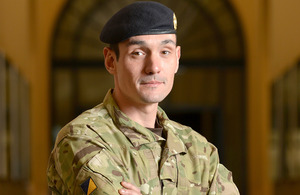Queen's Gallantry Medal for courageous bomb disposal soldier
A soldier who risked his life to defuse a series of IEDs in Afghanistan has been awarded the Queen's Gallantry Medal.

Sergeant David Acarnley, 11 Explosive Ordnance Disposal Regiment, Royal Logistic Corps [Picture: Corporal Steve Blake RLC, Crown copyright]
Sergeant David Acarnley, 31, a bomb disposal officer with 11 Explosive Ordnance Disposal (EOD) Regiment The Royal Logistic Corps, was called to the aid of a Danish armoured vehicle on 1 June last year after it hit an improvised explosive device (IED).
A secondary device had been located at the back door of the vehicle, trapping the crew inside. Sergeant Acarnley’s job was to make it safe so the soldiers could escape.
But as he worked another soldier triggered a 3rd IED, immediately becoming a priority casualty.
Without hesitation, Sergeant Acarnley switched tasks to clear a safe route across the deadly ground so medics could reach him and give life-saving first aid. He then returned to his original task to rescue the stricken crew.
Sergeant Acarnley, from Riding Mill, Northumberland, was on his 3rd tour of Afghanistan. He said:
I never really thought about the danger, I’m too laid back really. I searched my way towards the casualty using the detector and visual signs. But there’s a different kind of pressure when you know someone is injured.
Just 3 months earlier on 30 March, Sergeant Acarnley had again placed himself in extreme danger when he was tasked to make safe 150 kilograms of explosives discovered in a drain under Highway 1, the main route linking all of Afghanistan.
The explosives lay within a confined space and, although the device had been disarmed by a robot, the explosives still remained volatile and needed to be carefully removed.
The only way he could reach them was to remove some of his protective equipment and crawl into the drain. Steadily, using a rope he hauled all 150 kilograms of explosives out of harm’s way.
His citation states:
Working in the face of extreme danger from IEDs, exceptional heat and the stress of the high operational tempo, Acarnley has been tested both tactically and technically. He has time and again demonstrated unstinting bravery in the face of multiple, complex and imminent explosive threats.
The Queen’s Gallantry Medal is awarded to military personnel for acts of exemplary bravery not in the presence of the enemy.
Sergeant Acarnley joined the bomb disposal unit after a visit to the job centre, he explained:
I went to sign on and the bloke there was ex-Army. I told him I used to build fireworks in my dad’s shed, so he suggested I go and be an EOD technician. I feel as though I do a worthwhile job, it’s nice to be professional at something.
Sergeant Acarnley said he found out about his award while he was repairing his car, he said:
My Operations Officer rang me up to say the Commanding Officer wanted a word; I thought I was in trouble. So I cleaned myself up and went in to work. He sat me down and said: ‘Congratulations you’ve been awarded the QGM.’ It was a real surprise.
The announcement was made on 22 March with the release of the latest operational honours and awards list which includes 118 personnel. The awards are for actions roughly during the period April to September 2012 during Operation Herrick 16.
Sergeant Acarnley, based in Didcot, Oxfordshire, is one of 3 soldiers to be awarded the medal.